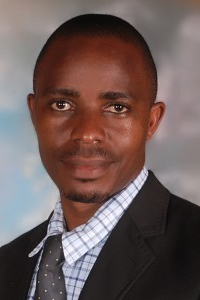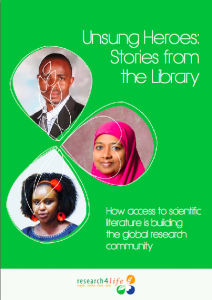From entomologist to agricultural librarian
Becoming a master trainer equipped Onan Mulumba, agricultural librarian at Makarere University to fuel evidence-based agricultural research and innovation in Uganda.

As an entomologist training Ugandan beekeepers how to better produce, process and market honey on the domestic and international markets, Onan Mulumba faced many challenges posed by the lack of up-to-date, evidence-based scientific information. “There were pests and diseases that attacked the bees.”
The beekeepers also needed to know how to construct modern beehives from local materials and how to process the honey to meet international standards. “I had to look for solutions,” he explains, “It would have helped to have information on the research being done inside and outside Uganda to train the beekeepers better.” But with aging textbooks and intermittent Internet access as his tools, Onan’s search for solutions produced more frustration than answers.
At the same time, Onan also worked as a high school biology teacher, but found that poor resources prevented him from effectively training his students. When he learned that a post as an academic librarian had opened up at Uganda’s prestigious Makerere University, he jumped at the opportunity. In 2007, he joined the 42,000-student institution as an agricultural librarian trainee.
“I was very proud of having a new direction in my career learning how to process and manage information resources,” he proclaims. Initially, Onan spent most of his time helping students and researchers locate textbooks and print journals. “Book circulation was very high and it was a lot of work to reshelve everything,” he recalls, “I would be very exhausted by the end of the day.” After receiving training in the use of electronic resources and the Research4Life programmes, his professional activities changed dramatically. He now spends much of his time conducting training sessions for researchers, teaching staff and students.
The increased use of Research4Life has drastically reduced requests for books and print journals. Students jockey for access to the library’s computers. Assisting library users now involves helping them find the precise key words to improve their search results or gain access to full-text articles when they are not readily available.
To maximize the benefits of the various Research4Life programs, the librarians work collaboratively in the training sessions and refer library users to colleagues who have expertise in particular fields such as geography, nutrition, the environment and tourism, explains Onan, who specialises in agriculture. Research4Life has helped boost the quantity and quality of the faculty’s publications as well as student dissertations. It has also fueled scientific innovations. Makerere researchers have developed a new bacteria-resistant tomato; bred four soybean varieties that are high yielding, early maturing, and resistant to leaf rust disease; developed new technology to increase beef production; and established new protocols for banana tissue cultures.
As scientific output has increased, so has the University’s ranking and academic visibility. Faculty and students acknowledge the role Research4Life has played in their professional development. “AGORA was my saviour during my doctoral studies,” Dr. Abel Atukwase declares. Kamatara Kanifa credits Research4Life with helping her design the experiments for her Master’s and PhD theses. Dr. Jeninah Karungi says he regularly uses Research4Life in his teaching and the preparation of his scientific papers for publication. Access to thousands of online journals, books and databases has transformed the way librarians are thought of at Makerere University, explains Onan. “Instead of viewing librarians as mere book dust removers, they see us as resourceful information agents without which research is impossible.”
Makerere University is also making the latest agricultural research findings available to farmers confronted with pest infestations and plant diseases. “The farmers come from great distances to the different Makerere University campuses for advice,” says Onan, “They want an immediate solution because the new crop pests in Uganda are very destructive. We can now search the databases to get the knowledge they need.”
The pride he takes in contributing to improving Uganda’s scholarship and food production has motivated Onan to pursue his studies. “Now that I have experience in searching for scientific information from Research4Life, I see myself in five years with a PhD in Library Science, using my background in entomology, and taking on new academic roles in teaching, writing and publishing,” he says.






